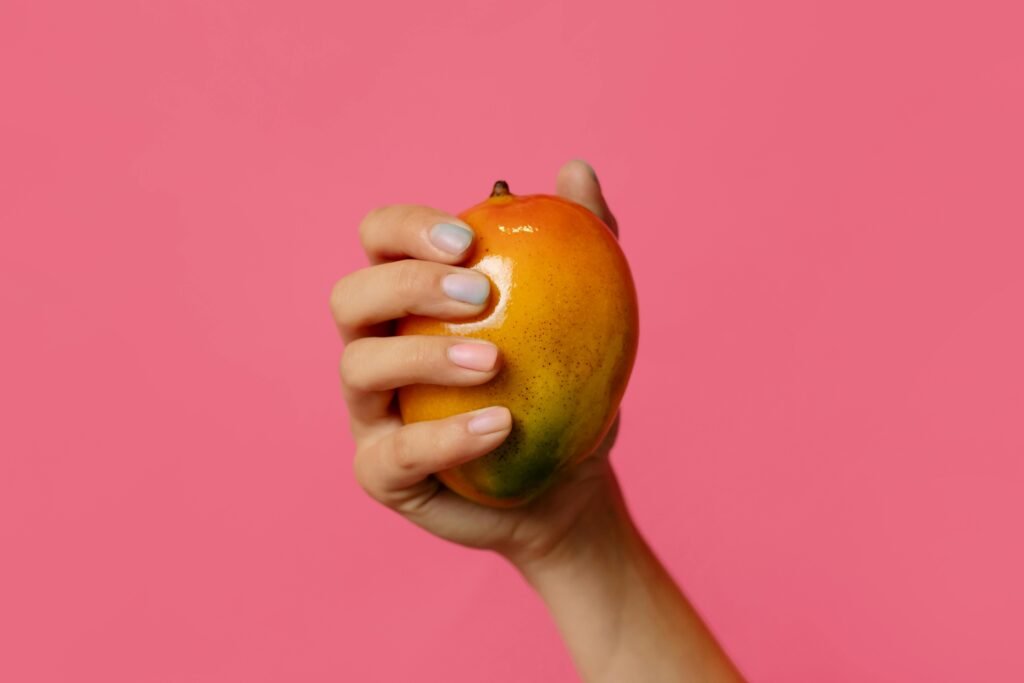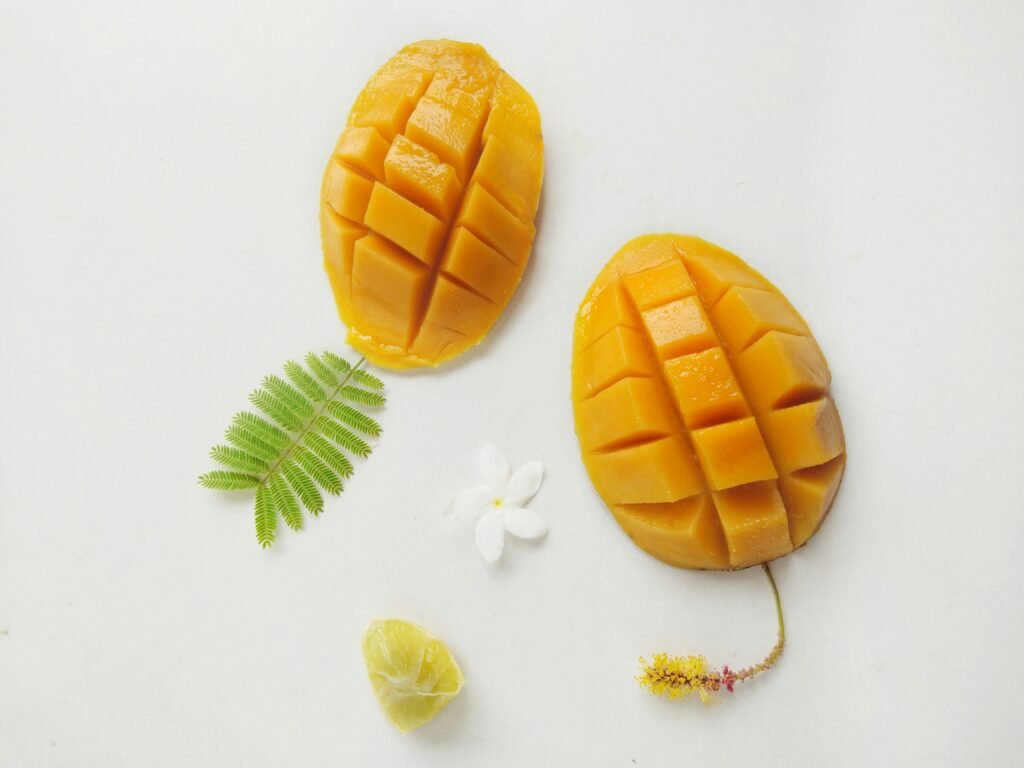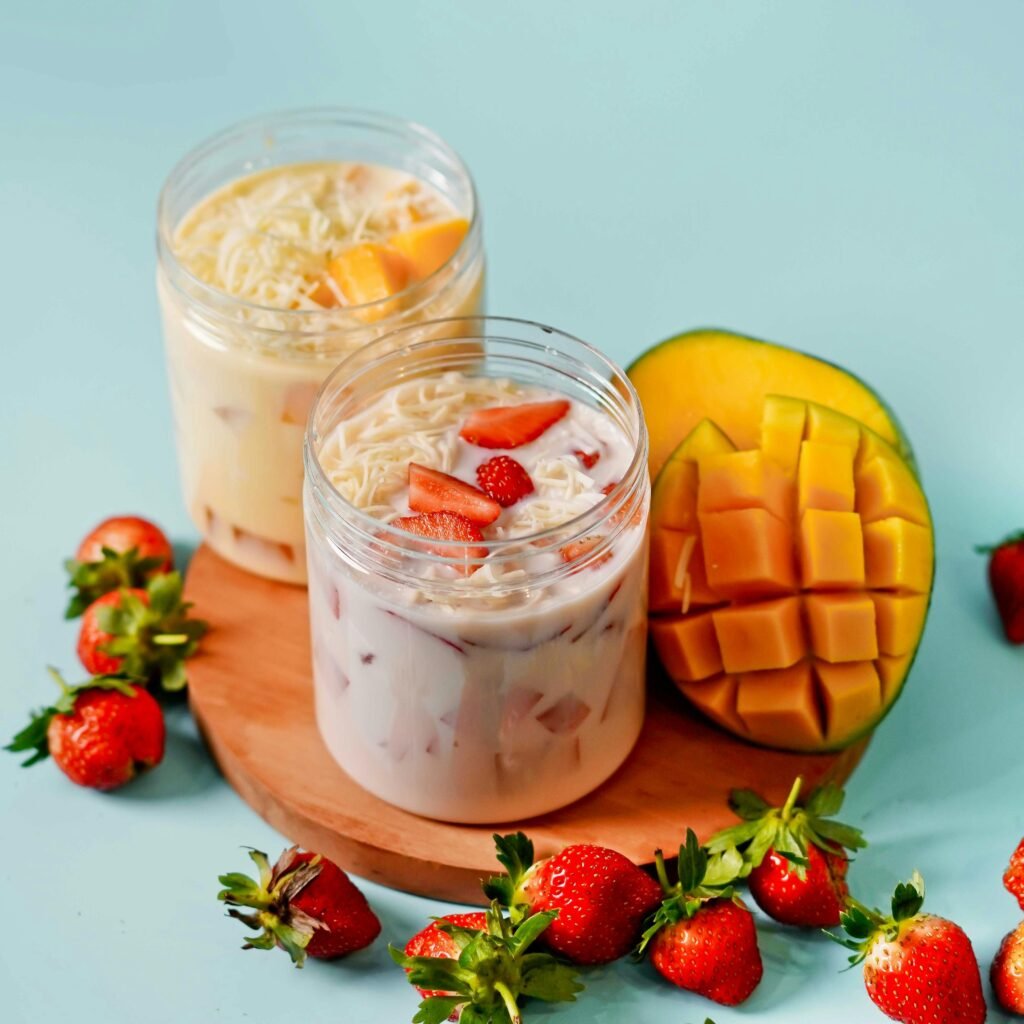Research shows that eating Mangoes and getting their nutrients may bring many health advantages, like better immunity and digestion. Also, some substances called polyphenols in mangoes might help lower the chance of getting certain cancers.
Here are 10 advantages of mango, along with a look at its nutrition and some ideas on how to enjoy it.
1. Loaded with Nutrients
Mangoes are loved not only for their delicious taste but also because they are very good for you.

In just one cup (about 165 grams) of fresh mango, you get:
- Calories: 99
- Protein: 1.4 grams
- Carbohydrates: 24.7 grams
- Fat: 0.6 grams
- Fiber: 2.6 grams
- Sugar: 22.5 grams
Plus, it’s packed with essential vitamins and minerals:
- Vitamin C: 67% of what you need in a day
- Copper: 20%
- Folate: 18%
- Vitamin B6: 12%
- Vitamin A: 10%
- Niacin: 7%
- Vitamin E: 10%
- Vitamin K: 6%
- Potassium: 6%
- Riboflavin: 5%
- Magnesium: 4%
- Thiamine: 4%
One of the best things about mangoes is that just one cup provides almost 67% of the vitamin C you need in a day. This vitamin is important for your immune system, helps your body absorb iron, and helps your cells grow and repair.
Mangoes also give you important minerals like copper and folate, which are really good for pregnant women because they help the baby grow healthy.
2. Calorie-Conscious
Another good thing about mangoes is that they don’t have a lot of calories.
In one cup (about 165 grams) of fresh mango, there are fewer than 100 calories. This means that for the amount of food you get, there are only a few calories.
Most fresh fruits and veggies have low calories for the amount of food you get. One study found that eating fresh fruit like mango before a meal might help you not eat too much later.
But remember, this might not be true for dried mango. Just one cup (about 160 grams) of dried mango has 510 calories and 106 grams of sugar, and it’s more packed with calories.
Even though dried mango still has lots of good stuff like vitamins, minerals, and things that fight off bad stuff in your body, it’s best to eat it in small amounts because it has lots of calories and sugar.
3. Potential Diabetes Prevention
Many studies show that eating more fresh fruit might lower the risk of diabetes. Not much research has looked at the connection between fresh mango and diabetes specifically.

However, one study found that people who ate 10 grams of freeze-dried mango every day for 12 weeks saw their blood sugar levels get better.
Another study said that eating fruits and veggies high in vitamin C and carotenoids might stop diabetes from starting. Mango has lots of these nutrients, so it might help too, but we need more research to be sure. Because mango has lots of natural sugars, it might make your blood sugar go up if you eat too much at once.
So it’s still a good idea to eat mango in moderation, like about one cup (165 grams) at a time. Eating it with other foods that have fiber and protein might also help stop your blood sugar from going up too much.
4. Rich in Beneficial Plant Substances
Mango is full of polyphenols, which are plant substances that work as antioxidants to keep your body safe.
This fruit has more than a dozen different kinds in its flesh, peel, and even seed kernel. Some of these are:
- Mangiferin
- Catechins
- Anthocyanins
- Gallic acid
- Kaempferol
- Rhamnetin
- Benzoic acid
Antioxidants are important because they defend your cells from free radicals. These are super-reactive compounds that can harm your cells. Studies show that free radical damage is linked to aging signs and long-lasting diseases.
Among these polyphenols, mangiferin is the most interesting and is sometimes called a “super antioxidant” because it’s very strong.
Tests on tubes and animals found that mangiferin might fight free radical damage that leads to cancers, diabetes, and other sicknesses.
5. Boosts Immunity with Nutrient Power
Mango is full of nutrients that help your immune system stay strong.

In just one cup (165 grams) of mango, you get 10% of the vitamin A you need every day.
Vitamin A is really important for a healthy immune system. If you don’t get enough of it, you might get sick more often.
Also, one cup of mango gives you nearly 75% of the vitamin C you need daily. This vitamin helps your body make more white blood cells that fight off diseases. It also helps these cells work better and keeps your skin strong against germs.
Mango also has other nutrients that might help your immune system, like:
- Copper
- Folate
- Vitamin E
- Some B vitamins
6. Promotes Heart Health
Mango has nutrients that keep your heart healthy.
For example, it has magnesium and potassium, which help your blood flow stay healthy. These nutrients relax your blood vessels, which can lower your blood pressure. Also, mango has a special antioxidant called mangiferin that’s good for your heart.
Tests on animals found that mangiferin might keep heart cells safe from inflammation, stress caused by oxygen, and cell damage. It might also lower the levels of cholesterol, triglycerides, and fatty acids in your blood.
But, while these results are hopeful, there’s not enough research on mangiferin and heart health in humans yet. So we need more studies to be sure.
7. Could Enhance Digestive Wellness
Mango has many qualities that are great for your digestion.

Firstly, it has a group of enzymes called amylases. These enzymes help break down big food molecules so your body can absorb them easily. Amylases change complex carbs into sugars like glucose and maltose. They’re more active in ripe mangoes, which is why they taste sweeter than unripe ones.
Plus, mango has lots of water and dietary fiber, which can help with digestive problems like constipation and diarrhea. In a study that lasted 4 weeks, adults with ongoing constipation found that eating mango every day helped more than taking a supplement with the same amount of soluble fiber as mango.
This shows that mangoes might have other things that help digestion, besides just fiber. But we need more research to be sure.
8. Possible Support for Eye Health
Mango has lots of nutrients that help keep your eyes healthy.
Two important ones are lutein and zeaxanthin, which are antioxidants. These nutrients are found in the retina of your eye, which turns light into signals that your brain understands. They’re most found at the center of the retina, called the macula.
In the retina, lutein and zeaxanthin work like a natural sunscreen, soaking up extra light. They also seem to protect your eyes from harmful blue light. Mangoes also have vitamin A, which is good for your eyes.

If you don’t get enough vitamin A in your diet, it can lead to dry eyes and trouble seeing in the dark. Not having enough of it can even cause serious problems like scars on your cornea.
9. Potential Cancer Risk Reduction
Mango has lots of polyphenols, which might help fight cancer.
Polyphenols can shield your body from something bad called oxidative stress, which is linked to many types of cancer. In tests done in labs and on animals, mango polyphenols lowered oxidative stress. They also stopped or slowed down the growth of different cancer cells, like ones found in leukemia, colon, lung, prostate, and breast cancers.
One of the main polyphenols in mango, called mangiferin, has shown it might fight cancer too. In tests on animals, it lowered swelling, protected cells from oxidative stress, and either stopped cancer cells from growing or killed them.
Even though these tests look hopeful, we need more studies on people to understand if mango polyphenols really can fight cancer.
10. Simple to Incorporate into Your Diet
Mango is yummy, can be used in many ways, and is simple to include in your meals.
But sometimes, it can be hard to cut because of its tough skin and big pit.
Here’s a good way to cut a mango:
1. Keep the skin on and slice long, vertical pieces about 1/4 inch (6 mm) away from the middle to separate the fruit from the pit.
2. Cut the fruit on these slices into a grid pattern without cutting the skin.
3. Scoop the cut fruit out of the skin.

Here are some ways you can enjoy mango:
- Put it in smoothies.
- Dice it and mix it into salsa.
- Add it to a summer salad.
- Slice it and eat it with other tropical fruits.
- Dice it and add it to the quinoa salad.
- Mix mango into Greek yogurt or oatmeal.
- Put grilled mango on top of burgers or seafood.
[…] Discover the Amazing: 10 Health Boosts of Mangoes! […]